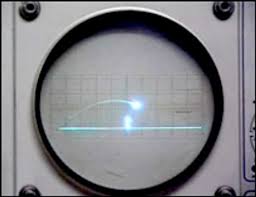As the years go by, we've seen games go from 8 and 16-bit sprites to full three dimensional models consisting of thousands of polygons, but can gaming continue advancing and innovating at the rate that it has been indefinitely? Let's start by first taking a look at Moore's Law.
Moore's Law states that approximately every two years (18 months depending on who you ask) the number of transistors that can fit on an integrated circuit doubles - meaning that technology has been exponentially growing since 1971, even though the trend was detailed in Gordon E. Moore's paper in 1965. So far, this has proven to be true (hence "Law" in the name), but can it truly go on forever? Is it possible to eventually have infinitessimally small transistors to continue pumping out hardware that's two times as powerful as the previous two years? This same question is exactly what I ask of gaming.
Let's take a look at one of the first video games.

Tennis For Two (1958)
While this game isn't the VERY first, it's one of the first things we could consider a video game. Using a vector display on an oscilloscope, a simple tennis game was created, it was monochromatic in color, and consisted of hitting a glowing sphere back and forth. This was one of the progenitors of video games, and started as a very very basic machine.
Now let's skip ahead to 1972. This was the year that "Pong" came out, arguably, the first mainstream video game.

Imagine how badly the kids these days would bitch and throw a fit about graphics...
Yet again, we're presented with monochromatic color - black and white. The game, like "Tennis For Two," consisted of hitting a block back and forth, and this was Pong. A simple scoring mechanism is displayed at the top, to let you know which long white rectangle is winning, and it's from here that the saga continues.
To give you a brief history of consoles, let's go through the timeline of the various generations of gaming systems.
The Odyssey marked the beginning of the First Generation of Consoles, including others like the Atari Pong standalone, the Coleco Telstar, and the Nintendo Color TV Game
The Fairchild Channel F marked the beginning of the Second Generation of consoles, including other more known consoles such as the Atari 2600, the Magnavox Odyssey 2, the Intellivision, the Atari 5200, Vectrex, Colecovision, and more.
The Nintendo Famicom/NES marked the beginning of the Third Generation of consoles, as well as the Sega Master System, and the Atari 7800, among a few others. This was the when gaming was brought truly into the mainstream, with, at the time, more accessible prices and better libraries of games.
The PC-Engine/TurboGrafx-16 marked the beginning of the Fourth Generation of consoles, along with heavy-hitters Sega Genesis/Mega Drive, Super Famicom/SNES, and the outrageously priced, low-selling Neo Geo (but come on, Samurai Showdown DID rule.)
The Fifth Generation of consoles, also known as the 32-bit era, or after the release of the N64, the 64-bit era, was a time known most notably for three major consoles - the Sony Playstation, the Sega Saturn, and the Nintendo 64.
This was when the line between cartridge and CD-Rom was drawn, and console creators had to choose their mediums.
The Sixth Generation of consoles was an era dominated by 128-bit systems, the Sega Dreamcast, Sony Playstation 2, Nintendo Gamecube, and was Microsoft's introduction into the console market with the original Xbox.
The Seventh Generation of consoles is the current/currently ending generation of consoles (as early as 2005 to current) which of course includes the Nintendo Wii, Xbox 360, and Sony Playstation 3.
The Eighth Generation of consoles is the WiiU, PS4 (whatever it may look like), and whatever goofball name Microsoft comes up with for their next console.
Now that we can see where consoles began and where they've gotten to now, we can ask the question, if Moore's Law is true, will video games progress in a similar way as that of the integrated circuit? For clarification, I mean the games themselves, their concepts, graphics, sounds, music, etc., not just simply the hardware behind them. So let's choose a gaming starting point that everyone is familiar with - since we've already gone over Pong and Tennis for Two, let's pick up the slack with "Super Mario Bros." for the NES. For many, this was their first true taste of video games, and it had a simple color palette consisting of 64 colors, but some of the shades of gray have seemed so similar, some believe that it only has 53-55 colors. It was simple, simple color scheme, simple concept. An Italian plumber that can only move to the right must run and jump and travel through pipes to save a princess. This story is so generic nowadays, but back then it was relatively original, and brought a fun gaming experience to homes around the globe.

Look at these sexy ass consoles - the prim, proper, and experienced SNES, and the dark and mysterious bad-boy Sega Genesis. Admit it, you'd sleep with both of them.
The SNES and Sega Genesis, among others, took this experience to the next level, with a more robust color palette, better soundchips, and overall better hardware. Games were longer, more engaging, take the SNES Final Fantasy games for example, or some of the Genesis platformers like Rocket Knight Adventures or the Sonic games. They were faster paced, utilized more buttons for more intuitive controls and more actions in-game, the sprites were bright and robust, providing a deeper and more immersive gaming experience. Many games fit well established genre labels, like platformers, RPGs and scrolling shoot-em-ups, but games were still original, with wildly varied plot lines - look at Ecco The Dolphin, a science fiction aquatic adventure, which the only current game I can think of that is even reminiscent to the aforementioned description would be Bioshock.
On the Dreamcast, PS1, and N64, we had games that were full 3D with even better color palettes, sounds, and animation. Games like Mischief Makers, Einhander, Twisted Metal, Final Fantasy 7, Turok, and others, were all great games that brought immersive 3D worlds to life with great storylines and controls, with intuitive combat mechanics and smooth (for the time) gameplay, but they all drew from earlier games, platformers, racing/action games, and shooters all did similar things, just with different hardware boundaries, but games continued to progress.
With the advent of the PS2, Gamecube, and Dreamcast, we had more games with better visuals, sound effects, music, and gameplay mechanics, with more buttons for more player input and control, genre blending and bending, with various games taking elements from other genres and splicing them into one seamless gameplay experience, further advancing the way we see, hear, and play games.
Now we're at our current generation games, with blockbusters like Mass Effect, Call of Duty, Battlefield, and even still running strong, Final Fantasy, bringing us amazing and gorgeous gaming experiences, but how long can this last? Again, we're not talking purely hardware, we're talking the concepts behind games. We're flooded with war-driven first person shooters, fantasy role playing games, science fiction games, sandbox games, everything that we can see, hear, and play is already labeled with a genre, and is already, to a degree, unoriginal, just like the aforementioned games on previous consoles. Yes, it's practically impossible, if not entirely impossible, to come up with a game that's entirely original in every sense of the word, but it feels as if the gaming landscape is becoming stale, with cookie cutter games being released with different names, models, and sounds. Can we continue to progress, or will we eventually retrogress to a gaming landscape similar to that of the 8 and 16 bit eras, with simple, two-dimensional worlds, and straightforward plot-lines, in order to deliver a gaming experience that's different enough than what we're used to? As humans, we crave variety, yet at the same time we want something familiar, that happy medium is what we've come to expect of games - the mechanics and gmaeplay are familiar, shooters have similar control schemes, RPGs have similar control schemes, but the storylines, graphics, and sound effects are all different in small ways, but in general everything can be labeled.
Is the day coming where the full blown sandbox open worlds and gorgeous crafted 3D worlds will become stale and unappealing to the gaming market? I for one am already tired of most modern games, with Mass Effect being the only series I've been following and purchasing religiously, and I'm already craving the return to two dimensional side-scrolling glory. I think that much like the wheel of history, that we will eventually hit a conceptual ceiling and games will revert to ideals and practices similar to those of yesteryear. Let me know what you think in the comments, I'm curious to see what the rest of the gaming culture thinks about the idea of conceptual progression.






Comments